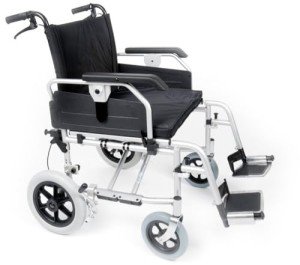What Bariatric Folding Wheelchair Experts Want You To Know?

Bariatric Folding Wheelchair

Bariatric folding wheelchairs are developed to accommodate users of a bigger size. They include a higher weight capacity than basic models and are built with reinforced materials for included stability and longevity.
Nevertheless, not everybody with a high body mass index (BMI) needs a bariatric chair as numerous fall within the safe weight limitations of standard wheelchairs.
Size and Weight Capacity
Bariatric wheelchairs have larger seats and are created to accommodate larger people, normally weighing as much as 500 pounds. These chairs have a heavy-duty frame made from strengthened materials like steel and are constructed with bigger wheels that provide more weight distribution and maneuverability for bigger users.
When comparing bariatric high back wheelchair , make sure the weight capacity is listed as static or active load. Static weight capacity refers to how much a chair can hold when it's sitting still, while active load capacity is figured out by putting the chair through a drop test that mimics someone plopping down into the seat.
Standard wheelchairs are widely produced and developed for users with typical body weights, making them more budget-friendly than bariatric designs. Medicare and other insurances may only cover a limited variety of bariatric wheelchairs, depending upon a client's medical needs and diagnosis. These chairs are also more pricey than basic wheelchairs since they have a customized design and building. However, they are a terrific service for patients with a vast array of medical conditions that need a more comfy travel experience.
Seat Dimensions and Comfort
Unlike basic wheelchairs, bariatric models have broader seats to accommodate larger people. They also have more robust frames and big, long lasting wheels that can endure higher loads. They can be tailored with various seating choices and devices based on the user's requirements and preferences.
When comparing wheelchairs, it's crucial to look at their weight capacities under both static and active load scores. Fixed load refers to the chair's maximum capacity when it's sitting still, while active load measures how much a wheelchair can securely hold when someone sits in it and moves around. Some manufacturers might likewise show the weight limit of a bariatric wheelchair in kgs, which is often more precise since it considers the average bodyweight of an individual who uses the chair.
In addition to a wide seat, a bariatric folding wheelchair should have adjustable padded leg rests to help users remain comfy while traveling. It should also have turn up armrests that can be moved out of the way to prevent getting in the user's method when they desire to stand up or transfer to another surface area.
If you're thinking about a bariatric wheelchair, ask a doctor or mobility professional for recommendations. They can examine your needs, advise the best chairs for you, and guide you through the procedure of purchasing one. They can likewise help you compare functions and prices to find a wheelchair that best fits your budget plan. They can even offer recommendations on other mobility services such as power positioning systems and iLevel seating.
Weight and Portability
While basic wheelchairs are usually budget-friendly, bariatric chairs tend to be a bit more pricey. This is because of their specialized style and building, along with the reality that they're a little much heavier than their counterparts.
If you're concerned about the expense of a bariatric chair, talk with a health care provider or mobility specialist. They'll be able to assess your distinct needs and determine which type of wheelchair is the very best suitable for you. They can also suggest wheelchair devices based on your specific requirements. In addition, if you're wanting to get your wheelchair covered by insurance coverage, such as Medi-Cal, they can guide you on the steps associated with this process. For additional information, read our guide to wheelchair insurance protection. Then, you can start your journey towards independent mobility.
Manoeuvrability and Handling
Picking the right wheelchair can be an important decision for those with restricted mobility. Bariatric wheelchairs offer increased weight capacities and are designed to accommodate larger individuals. They normally include larger wheels, larger armrests and seating choices, and are tougher than standard wheelchairs.
When selecting a bariatric wheelchair, consider the individual's particular requirements and the environment in which they will be utilizing it. Examine the weight capacity and seat dimensions, and try to find adjustable functions like cushioned raising leg rests to support convenience and ease of transfer.
Determine whether the wheelchair appropriates for manual or powered usage. For added flexibility, a bariatric folding wheelchair can be quickly folded and compacted for storage or transport. This makes them a perfect option for those with limited home area or who need to travel long ranges. The wheelchairs likewise include leak proof wheels to make sure toughness and low upkeep. Appropriate for users approximately an optimum of 35 stone.
